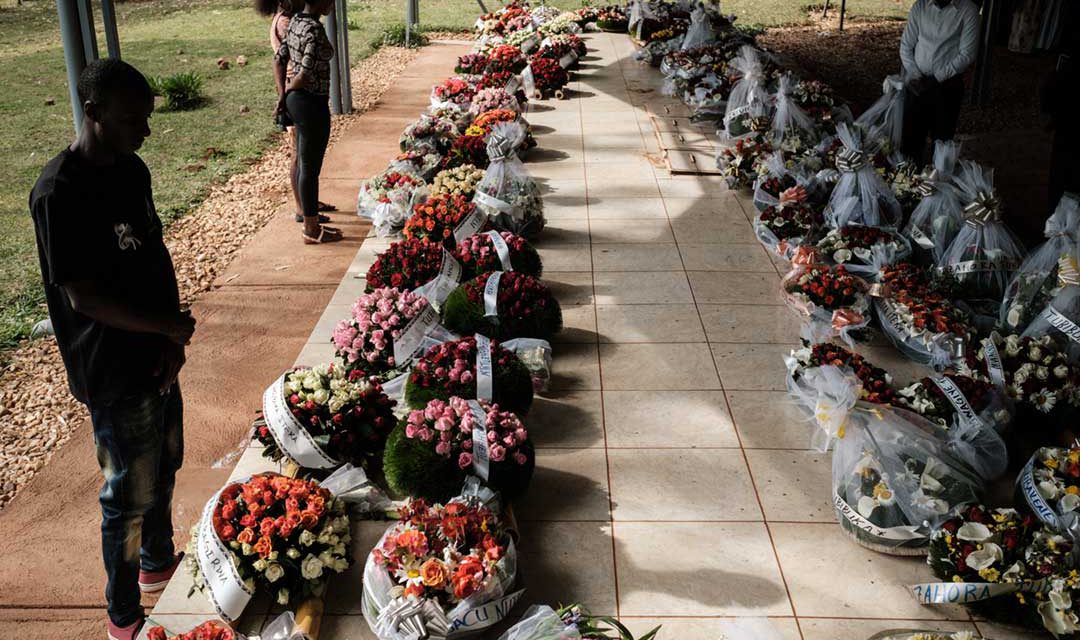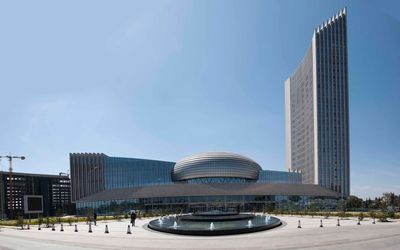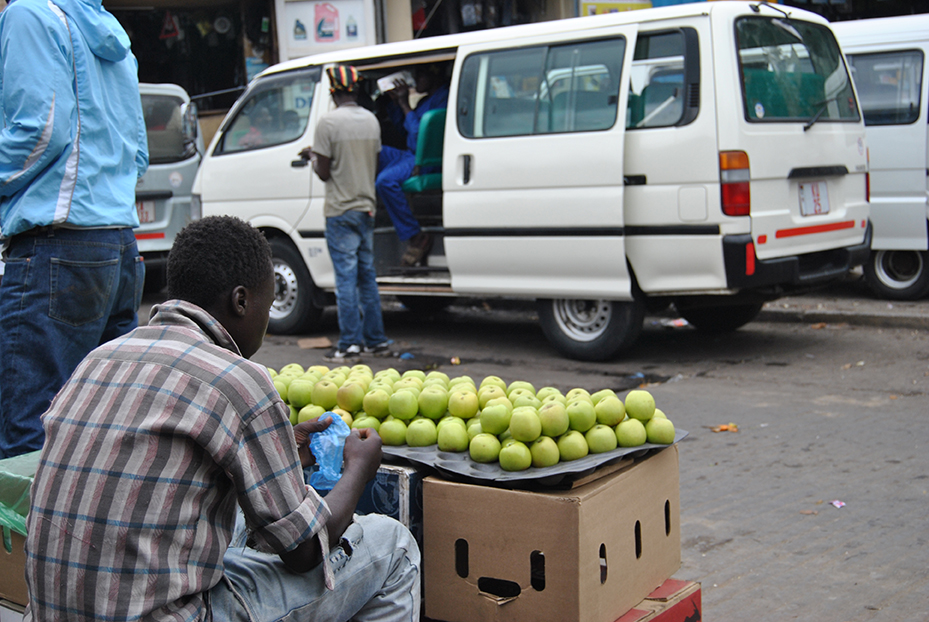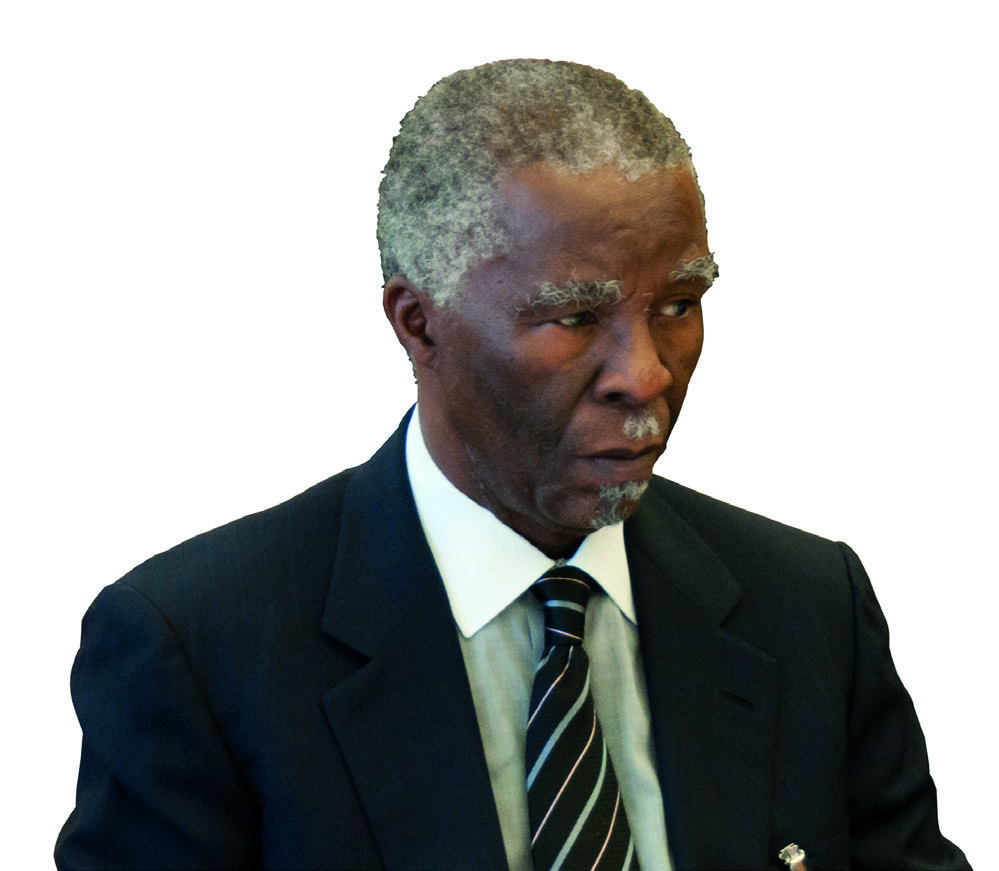Rwanda: the genocide archives
Amid mounting calls for an honest investigation into the Rwandan genocide, the UN and certain governments appear to be opposing full disclosure
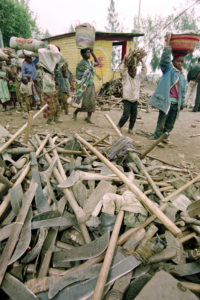
A group of Rwandan refugees walk past a pile of machetes and axes confiscated by the Zairean army on July 16, 1994 in the border city of Goma. (Photo by PASCAL GUYOT / AFP FILES / AFP)
“Everyday we learn to forgive,” President Paul Kagame told a commemoration of the 25th anniversary of the Rwanda genocide in Kigali in April this year, “but we do not want to forget.” Yet, 25 years after the 1994 genocide against the Tutsis in Rwanda, full disclosure and recognition of responsibility for what happened, particularly as regards members of the international community, are still outstanding. The International Criminal Tribunal on Rwanda (ICTR), established in 1994 and dissolved 2015, dealt with the planners and the architects of the genocide. Almost two million people accused of helping to perpetrate the genocide were tried before the traditional Gacaca courts between 2001 and 2012. But questions of international responsibility remain unaddressed. Moreover, investigators, researchers and historians face obstacles in the way of establishing the truth. In June 2014, the Rwandan government established the Rwanda Archives and Library Services Authority (RALSA).
Yet despite pledges by international leaders to fully investigate what happened, members of the public elsewhere in the world still have only limited access to evidence about the genocide. UN Security Council deliberations on Rwanda, the Clinton White House papers and French and Belgian government documents remain classified. Apparently, this applies even to international court decisions. This year, the executive secretary of Rwanda’s National Commission for the Fight against Genocide, Jean-Damascène Bizimana, asked for, but was not granted, access to the ICTR archives. Olivier Nduhungirehe, to everybody, including survivors of the genocide, students and researchers,” he told Africa in Fact. What is clear is that the UN and certain governments are opposing full disclosure. During his speech earlier this year, Kagame paid a special tribute to the Czech ambassador, Karel Kovanda, who, he said, “joined colleagues from New Zealand and Nigeria to call for action to stop the genocide despite the indifference of more powerful states.”
He was probably referring to some of the five permanent members of the Security Council. While the massacres were occurring, three of the Big Five – France, the UK and the US – resisted the use of the word “genocide”, says British journalist Linda Melvern, author of the book A People Betrayed: the Role of the West in Rwanda’s Genocide, first published in 2000 and updated in 2009. To be sure, the UN is in a delicate position. Its inability to deal effectively with the genocide is still very much resented, and not only by Rwandans. No UN flag was flown at an homage ceremony in Kigali on 8 April, 2019 for 10 Belgian peacekeepers who were brutally beaten and shot to death by Rwandan government soldiers on 7 April, 1994. This despite the fact that the Belgian soldiers were members of the UN mission in Rwanda (UNAMIR). Their former comrades were outraged at their government’s order to the peacekeepers to surrender.
“Many of the Belgian soldiers had wanted to stay in Rwanda to prevent even greater slaughter and were humiliated by the government’s decision to withdraw them,” according to an OAU report of 7 July, 2000 by an international panel of eminent personalities. The former soldiers were also critical of the UN, which, they said, systematically underestimated the threats the Belgian blue helmets faced from Hutu extremists. “The withdrawal meant that they were viewed as cowards, and morally irresponsible ones as well,” reads the report. “It is not surprising that many of them threw down their blue berets in disgust upon their return to Belgium. Others, in full view of the television cameras, pulled out their knives and slashed the berets into ribbons.” According to Melvern, the New Zealand ambassador, Colin Keating, told her that “non-permanent members of the [Security] Council were kept in the dark about what was happening”. Cables sent to the UN secretary-general’s office by UNAMIR’s field commander, the Canadian general Roméo Dallaire, did not reach the council.
They stayed in the secretary-general’s office on the 38th floor of the UN building in New York, she says. For whatever reason, Boutros Boutros-Ghali kept those cables to himself. Yet these cables included essential information. One was a fax General Dallaire sent to his superior, General Maurice Baril, at the UN Department of Peacekeeping Operations (DPKO) in New York, on 11 January, 1994. According to the OAU report, Dallaire warned that a militia commander who he had met “has been ordered to register all Tutsi in Kigali. He suspects it is for their extermination. Example he gave was that in 20 minutes his personnel could kill up to 1,000 Tutsis”. Despite this, Kofi Annan, then chief of peacekeeping operations, denied Dallaire permission to seize arms caches revealed by the informant. Moreover, Boutros-Ghali changed existing procedures regarding the transmission of information to the Security Council, determining that officials could brief the council only with his express permission, Linda Melvern discovered.
“All the information that went to the council came through Boutros-Ghali,” she says. In a report dated 21 April, the then secretary general did not mention mass killings, preferring to describe Rwanda as being in “a civil war”. Why did Boutros-Ghali restrict the information that went to the council? According to Melvern, it might have been because he was beholden to the French president, Francois Mitterrand, who had supported his election. To settle the question, she says that access to documents and the telephone records from Boutros- Ghali’s office will be necessary. According to Melvern, the permanent members of the UN Security Council refused for weeks to admit that a genocide was taking place. The British ambassador to the UN told the council that it would become “a laughing stock” if it described the events in Rwanda as a genocide, she says. And France also resisted the use of the word “genocide”. Some see France as bearing more responsibility for the international failure to act because of its direct involvement in the region.
Accordingly, access to the French archives has been a sensitive point for years. In 2015, the French president, François Hollande, declassified documents related to the genocide, including minutes from secret defence meetings and files of advisers to the president at the time, François Mitterrand. Researchers and historians would be granted access to the documents on request. Yet gaining access to those archives has proved extremely difficult. A former Belgian senator, Alain Destexhe, who published an essay on the genocide, told Africa in Fact that he was denied access to both Mitterrand’s archives and those of the defence ministry – supposedly because his “profile did not meet requirements”. Researchers also complain that only a fraction of the classified documents have surfaced so far. That might change. In April this year, President Emmanuel Macron appointed a commission of academics to carry out a two year investigation into the role of the French army in the genocide.
The commission will have access to presidential, diplomatic, military and intelligence archives. Kigali’s reaction was rather positive. But the problem, Alice Urusaro Karekezi, a researcher at the University of Rwanda’s Centre for Conflict Management, told the Kigali-based daily newspaper The New Times is that the commission does not include a single recognised expert on Rwanda. Moreover, access to Mitterrand’s archives was to be granted at the discretion of their custodian, Dominique Bertinotti, who told news agency Agence France-Presse in April this year that her approval is not “automatic”. Independent or inexperienced researchers will be confronted by staunch opposition from the French military establishment and officials who were in office in 1994, who deny that France holds any responsibility for the tragedy. The issue is so sensitive that it caused a controversy during the European elections campaign in May this year.
A claim by Raphaël Glucksmann – director of a documentary on the genocide and head of the Socialist Party list in the election – that Mitterrand had been an “accomplice” in the genocide triggered a letter of protest signed by 23 former ministers. Yet “the facts are stubborn”, as Kagame says. Prior to the genocide, France had been an important supporter of the Hutu regime in Kigali. According to a January 1994 report by Human Rights Watch (HRW), France was one of the regime’s main arms suppliers, along with Egypt and South Africa, before and after the war began between the Hutu-dominated government and Kagame’s Tutsi-dominated Rwandan Patriotic Front (RPF) in October 1990. France’s contribution included mortars, artillery, armoured cars and helicopters – in addition to providing military advisors to the Rwandan Gendarmerie and armed forces, according to HRW. According to Melvern, French military training extended to the presidential guard, which is thought to have initiated the genocide.
Moreover, France did not suspend its supplies of arms to the government after the imposition of a UN embargo on 17 May, 1994. Five shipments of artillery, machine guns, assault rifles and ammunition provided by the French government were sent to government forces based in Goma (in then-Zaire) in May and June of that year, according to a May 1995 report by HRW. Meanwhile, a French military operation between June and August in 1994, codenamed “Turquoise”, nominally under the UN, is another controversial issue. France portrayed Turquoise as a humanitarian mission to hide its support of the genocidaires, claimed Captain Guillaume Ancel, a French army veteran who served in the operation, in a 2018 memoir. Any declassification of US documents would also likely result in embarrassing revelations – in particular, as regards responsibility for the downsizing of the UN force that General Dallaire outlined in his book on the genocide, Shake Hands With the Devil (2003), and its tragic consequences.
“The United States almost single-handedly blocked international action in Rwanda [for] six weeks prior to the genocide, which might have prevented the bloodbath altogether,” says the above-mentioned OAU report. The US State Department even refused to scramble the broadcast of RTLM Radio, a Hutu extremist media outlet that incited killing during the genocide, according to Melvern. Half a million lives could have been saved if UNAMIR had had sufficient air support and logistical and communication capabilities, concluded Scott Feil, a former US army career officer, in a 1998 report to the Carnegie Commission on preventing deadly conflict. In April this year, more than 300 French academics, historians and citizens signed an open letter questioning Macron’s refusal to appoint suitably qualified experts – including Hélène Dumas, the only French researcher who speaks Kinyarwanda, and Stéphane Audoin-Rouzeau, a prominent historian of the first world war and author of a book titled Une initiation Rwanda (2017) – to the commission that is to investigate France’s role in the genocide.
In April this year, lawyers representing relatives of victims killed at Biserero in Rwanda between 27 and 30 June, 1994 by Hutu militias after the French army abandoned them there, called for access to the French Ministry of Defence archives for the French judges who were to investigate this tragic event. During a meeting with President Macron, another group, the Ibuka association of survivors, whose name means “remember” in Kinyarwanda, also called for the declassification of official French archives concerning the genocide. Former French military members who served in Rwanda during the 1990- 1994 period are claiming that the French government of the time worked closely with the Rwandan Hutu regime. Ancel, the former French army officer mentioned earlier in this article, claims that Turquoise, a French-led UN operation supposedly aimed at ending the massacres, was in fact intended to prevent the RPF from capturing Kigali. The aim was to return control of the capital city to the government, the former officer claims in his recent book, Rwanda, la fin du silence (Rwanda: the end of silence).
In another book, General Jean Varret, who headed the French military mission in Rwanda between October 1990 and April 1993, says that both Rwanda’s president at the time, Juvénal Habyarimana, and the French embassy ignored his warnings that the Rwandan military was planning to massacre Tutsis. The commission of inquiry will find it difficult to ignore these claims. The quest for the truth about the Rwanda genocide has been long, but the pressure is mounting. Researchers of the Rwandan genocide – academics, journalists, survivors, and French activists fighting for the decolonisation of France’s relationship with Africa and with the Rwandan government – are calling for open access to the genocide archives. The full truth of what happened then has yet to be established, they say. This includes vital information concerning the accountability of members of the international community.
Reply from the Spokesman of the Secretary-General of the United Nations
The United Nations has tried to ensure that there is justice for the crimes committed in Rwanda during the genocide, and it has looked at its own actions during that period, mostly notably through the Carlsson Commission, which issued its own report on the UN’s responsibilities in 1999. The UN has followed up on those recommendations in our effort to ensure that what went wrong in Rwanda will never be repeated. The statement from the article that “investigators, researchers and historians face obstacles when attempting to establish the truth” with respect to access to the archives of the ICTR is not supported by the facts. The Arusha branch of the International Residual Mechanism for Criminal Tribunals manages the archives of the ICTR. Its access policy is guided by the basic principles of openness and transparency, balanced with the obligation to maintain the confidentiality of classified information, including classified judicial records. The International Residual Mechanism cannot provide members of the public with access to the confidential records of the ICTR. The Judicial Records and Archives Database is accessible through a website (https://jrad.irmct.org/search. htm) containing approximately 850,000 pages of judicial records and 22,000 hours of audiovisual recordings of judicial proceedings. The physical location of the archives therefore does not impose an impediment to accessibility with respect to users in Rwanda. On average, each month, over 3,600 records are accessed, 10.5 access requests are responded to, and approximately 80 visitors are accommodated by the Archives and Records Section in Arusha. The claim in the article that access to the ICTR archives was denied to Rwanda’s National Commission for the Fight against Genocide and to personnel of the Permanent Mission of Rwanda to the United Nations is also unfounded. The International Residual Mechanism in Arusha has not received any request from Rwanda’s National Commission for the Fight against Genocide. One request was received from the Permanent Mission of the Republic of Rwanda to the United Nations, and it was responded to on the same day that it was received.
Francois MIsser is a Brussels-based journalist. He has covered central Africa since 1981 and European-African relations since 1984 for the BBC, Afrique Asie magazine, African Energy, the Italian monthly magazine Nigrizia, and Germany’s Die Tageszeitung newspaper. He has written books on Rwanda and the DRC. His last book, on the Congo River dams, is La Saga d’Inga

